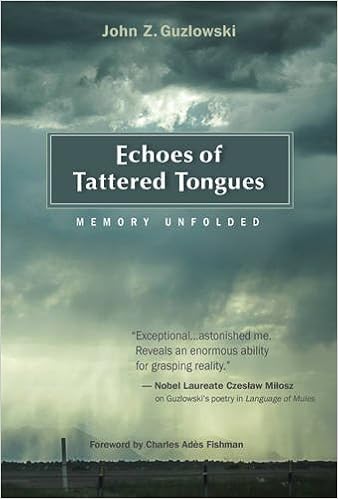
On Hope and Survival -- From an Interview I gave to Rattle Magazine:
RATTLE: The line “hope is the cancer no drug can cure” from “My Father Dying” struck me, because it so contradicts the way most of us define hope—as a sort of karmic wish that will aid in bringing us what we want, rather than the role it serves in the book as a foolish and fruitless burden. It interests me that our society, while overtly acknowledging the horrors of the Holocaust, seems to take a sugarcoated view of it: our films about it often temper the overwhelming suffering with “the strength of the human spirit”; we tend to toss around words like “hope” and “courage” when we talk about it. Your book, however, is unflinchingly raw and honest, refusing to do the cheap work of shining artificial light on darkness. Do you agree that the American view of the experience of the Holocaust is overly redemptive? Was it a conscious decision to write about such horrific events in an unapologetic way?
GUZLOWSKI: I was brought up on those redemptive books and movies about the Holocaust and the world of survivors that was depicted in films like Exodus, Diary of Anne Frank, Life is Beautiful, and Schindler’s List. I remember watching Schindler’s List with my mother and asking her at the end of the movie what she thought. She looked at me as if I were an idiot and said, “They can’t make movies about what really happened.”
I’m sure hope and courage were important in the camps, but probably what was most important was luck. I asked both of my parents how they were able to survive the war, and they both said they didn’t know. My father didn’t know why he didn’t die when so many of his friends did. He once told a story about being hauled out of his barracks with hundreds of other prisoners for a roll call. It was a January night, snowing and below zero, and the men were in rags. The guards started doing a roll call, and as they read the names men began to drop from the cold, falling to their knees. A man here and another there and then more. When the guards finished the roll, there were dozens of dead prisoners in front of the barracks. But they didn’t let the men go back in the barracks. Instead, the guards started the roll again, and more men collapsed. That roll call went on for six hours. At the end, garbage trucks came to pick up the dead. My father didn’t know what kept him alive.
What I’m trying to do in the poems is stay true to my parents’ experiences. My mother was especially unsentimental about what happened to her. As a girl, she had seen her family killed, and then she went on to suffer for two and a half years as a slave laborer in Nazi Germany. After the war, she lived for six years in refugee camps, camps where they had mass graves for the babies that were born to the women following the war, women whose bodies weren’t strong enough to carry their pregnancies to fruition. I think it’s hard to believe in hope and courage when you have that kind of experience.
I hope you don’t mind but here’s a poem I wrote about my sense of what my mom believed:
WHAT THE WAR TAUGHT HER
My mother learned that sex is bad,
Men are worthless, it is always cold
And there is never enough to eat.
Men are worthless, it is always cold
And there is never enough to eat.
She learned that if you are stupid
With your hands you will not survive
The winter even if you survive the fall.
With your hands you will not survive
The winter even if you survive the fall.
She learned that only the young survive
The camps. The old are left in piles
Like worthless paper, and babies
Are scarce like chickens and bread.
The camps. The old are left in piles
Like worthless paper, and babies
Are scarce like chickens and bread.
She learned that the world is a broken place
Where no birds sing, and even angels
Cannot bear the sorrows God gives them.
Where no birds sing, and even angels
Cannot bear the sorrows God gives them.
She learned that you don’t pray
Your enemies will not torment you.
You only pray that they will not kill you.
Your enemies will not torment you.
You only pray that they will not kill you.
Of course, not everyone had the experiences my mom had. Some, I’m sure, survived through hope and courage. I’ve met and spoken to a lot of survivors over the years. What it’s taught me is that different people looked at what happened differently and tried to make sense of it differently.
___________________





